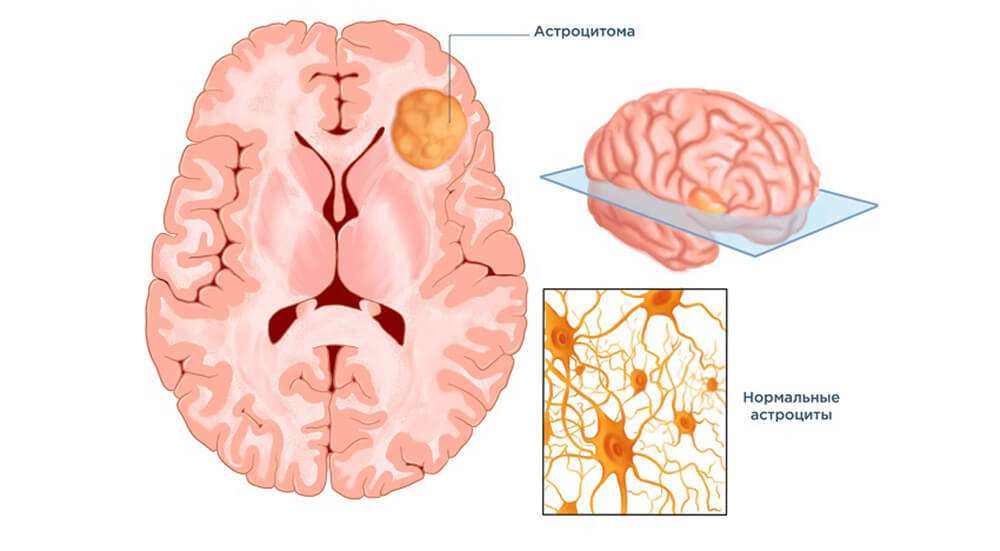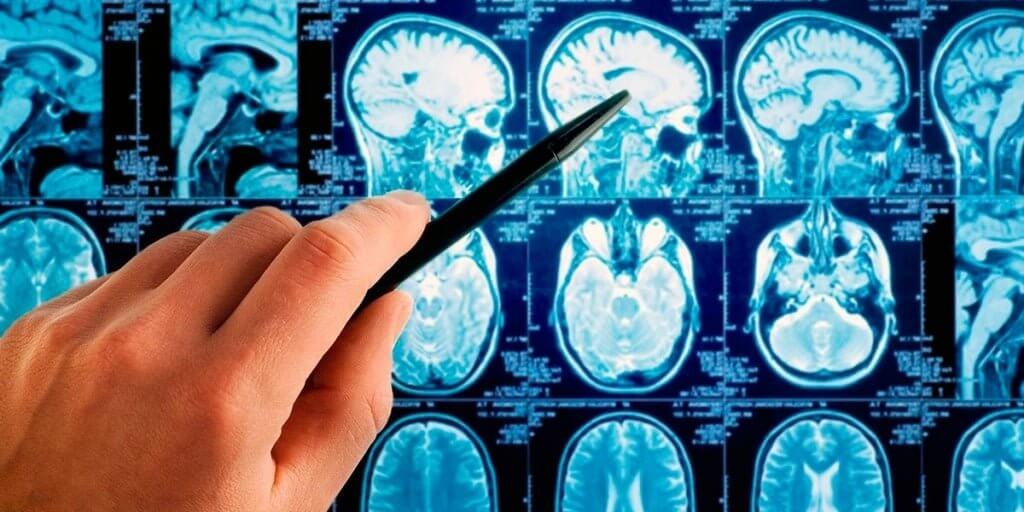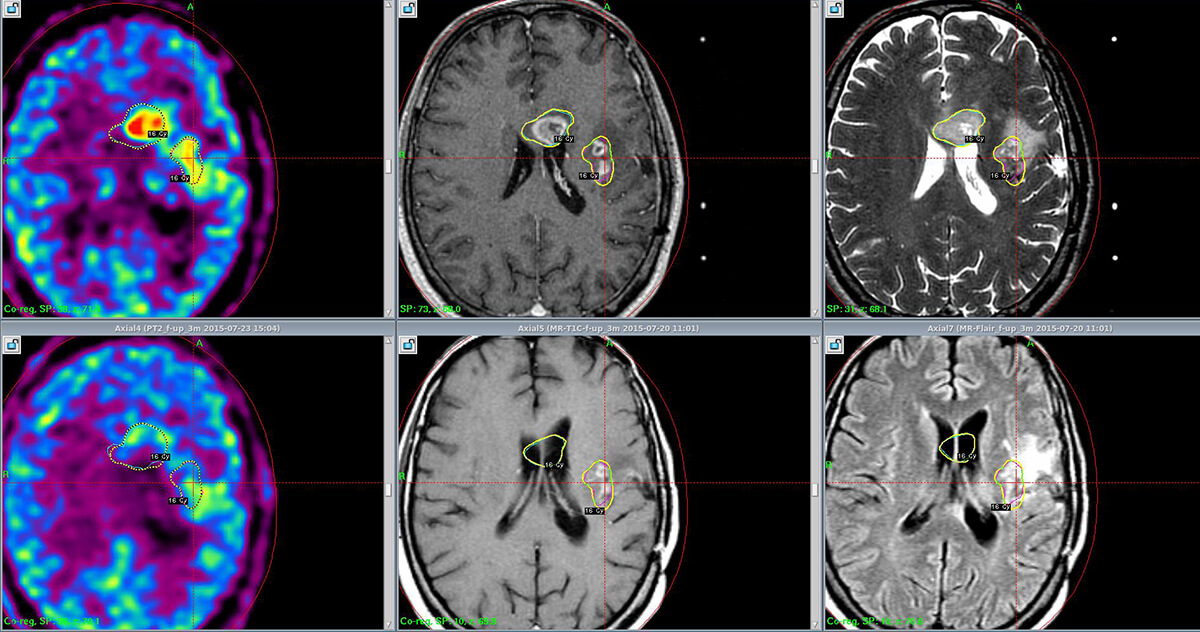Calls for Ukraine
Calls for Europe
Calls for USA

Astrocytoma is a brain tumor that belongs to the group of glial neoplasms and accounts for about 50% of their total number. It develops from neuroglial cells that are stellate in shape and called astrocytes. The tumor can occur in almost any part of the brain. An astrocytoma of the spinal cord may also develop.
This type of tumor is found in all age groups. Children are characterized by the development of astrocytoma mainly in the cerebellum, where nodular formations are formed, including cysts. Astrocytoma in adults is usually detected in the cerebral hemispheres.
How an astrocytoma manifests itself depends on its type and the location in which it formed. There are benign tumors that are well treated and malignant variants with a high degree of aggressiveness. The problem with treating astrocytomas is that they can arise near brain centers that regulate vital body functions, which can make surgical treatment difficult. However, in modern conditions it is possible to fight the disease even in difficult situations and with complex diagnoses. Neurosurgeons and neuro-oncologists today use a range of treatment methods and achieve good results that can prolong the patient’s life and improve its quality.
Would you like a free consultation?
To choose the best doctor and sign up for a consultation at the clinic, leave a request on the MedTour website. The medical coordinator will help you choose a doctor and select the best clinic, taking into account your wishes.
Free consultation
The exact reasons for the formation of brain astrocytoma still remain unclear. Among the factors that can provoke the development of this neoplasm are:
The asymptomatic period, when the tumor has already arisen but has not yet manifested itself, can range from several months to several years. It depends on the type of tumor and its location. The rate of further development of the tumor depends on its characteristics and the chosen treatment tactics.

Symptoms of the disease may differ depending on the location of the tumor and the strength of its pressure on surrounding tissues. The most characteristic symptoms of astrocytoma include:
In addition, symptoms arise due to the location of the tumor:
If such symptoms appear, it is necessary to immediately consult a doctor and undergo an examination that will help make an accurate diagnosis.
Would you like a free consultation?
To choose the best doctor and sign up for a consultation at the clinic, leave a request on the MedTour website. The medical coordinator will help you choose a doctor and select the best clinic, taking into account your wishes.
Free consultation

These growths are usually pale pink in color. In terms of density, they are practically no different from the brain matter. Visually, astrocytoma may look different depending on its type. It may be a round or oval formation with clear boundaries. Cysts often form inside neoplasms of this type. Or the tumor may be irregular in shape and have blurred boundaries.
At the moment, doctors distinguish four main groups of astrocytomas, which differ in the degree of malignancy. In accordance with the WHO classification, there are:
This is a benign astrocytoma of the brain. Doctors diagnose this type of pathology, as a rule, in childhood and adolescence. It grows slowly and is limited to a capsule. This tumor is found in the cerebellum and may also occur in the brain stem or near the optic nerves. As a rule, it has a cystic form.
This type of tumor is diagnosed in the hemispheres of the brain, namely in the white medulla. This tumor grows slowly. Doctors usually diagnose it at age 20-30. Diffuse growth astrocytomas are usually not clearly demarcated from surrounding tissues. But at the same time, they do not grow into nearby tissues and are not prone to forming metastases. However, tumors of this type have a tendency to recur.
A subtype of this type of tumor is gemistocytic astrocytoma. It grows more rapidly and often develops over time into the more dangerous anaplastic form.
Quite an aggressive type of tumor. Their characteristic feature is rapid growth, invasion of adjacent tissues and a high probability of metastasis. Anaplastic astrocytomas are usually diagnosed after 30 years of age, mainly in men.
Glioblastoma is considered the most dangerous type of astrocyte. This type of tumor does not have clear boundaries, they are characterized by rapid growth and often grow into surrounding tissues: the cerebellum, thalamus, hemisphere. In addition, glioblastoma metastasizes and has a high probability of relapse. It is usually diagnosed in people over forty-five years of age.

In order to make an accurate diagnosis, it is necessary to undergo an examination, which most often includes:
The choice of treatment tactics for brain astrocytoma is made by the doctor, taking into account the individual characteristics of the tumor and the nuances of the patient’s health condition. Preference is always given to removal of the astrocytoma. For benign tumors, surgical treatment is usually sufficient. Most often, patients recover completely after surgery. For the treatment of malignant brain tumors, surgical treatment is complemented by other methods: radiotherapy, chemotherapy, immunotherapy.
The purpose of surgery for astrocytoma is to remove the tumor in full or to the maximum extent possible. However, doctors may recommend a surgical approach even in cases where 100% tumor removal is not possible, as this can improve the patient’s quality of life and increase its duration.
In neurosurgery, techniques are constantly being improved, more modern equipment is used, which increases the accuracy and efficiency of the surgeon’s actions. Today, whenever possible, doctors prefer minimally invasive surgery. For example, instead of a traditional craniotomy, the doctor may perform surgery through the nose. Or, to gain access to the operation site, a very small hole is made in the skull. Modern operating rooms are equipped with a neuronavigation system. Dyes are also used during surgery. This allows surgeons to see the boundaries of the tumor more clearly and improves the surgeon’s precision.
Oncologists may use stereotactic surgery for astrocytomas up to 3 centimeters in size. CyberKnife can also be used in cases where the tumor is located close to vital parts of the brain and doctors do not recommend standard surgery. In this case, the tumor is exposed to high doses of ionizing radiation, which leads to the death of malignant cells. The procedure is done under MRI control, which increases the accuracy of the radiation and does not damage healthy tissue.
Doctors can prescribe radiotherapy as the main method of treatment or use it in combination with surgery. The purpose of its use is to remove remaining malignant cells after surgery or to slow the growth of astrocytoma. Typically, several sessions are prescribed, during which the doctor irradiates the area where the tumor is located. Internal radiotherapy may also be used. In this case, radioactive materials are placed next to the tumor or directly in it.
Chemotherapy is used in addition to surgical treatment or used independently. Chemotherapy can slow tumor growth and destroy malignant cells. However, this method has quite serious side effects.
Recently, targeted drugs have been developed that act on tumor cells with minimal side effects on healthy tissue.

Today, immunotherapy methods are used to combat brain tumors. Their action is aimed at activating the patient’s own immune system and including it in the fight against the tumor. For this purpose, anticancer vaccines are being developed. The technique is still being finalized, but today there are several vaccines that demonstrate their effectiveness and are successfully used in practice.
Both vaccines show good results, significantly increase survival, reduce the likelihood of developing metastases, and reduce the risk of relapse. They are combined with other methods, increasing the effectiveness of their therapy, and are well tolerated. Cancer vaccines can be used both to treat and prevent brain cancer.
To learn more about vaccines and the possibilities of their use in malignant diseases of the brain, you can contact the MedTour coordinating doctor.
Would you like a free consultation?
To choose the best doctor and sign up for a consultation at the clinic, leave a request on the MedTour website. The medical coordinator will help you choose a doctor and select the best clinic, taking into account your wishes.
Free consultation
In order to predict the further development of events with astrocytoma, it is necessary to take into account several factors:
According to statistics, life expectancy with astrocytoma depends on the aggressiveness of the tumor:
But it is important to remember that these figures are only general indicators and may vary depending on individual factors. Thanks to advances in the field of neuro-oncology, even in the most difficult situations, it is possible to prolong life and improve the quality of life of patients.
The MedTour platform cooperates with the most advanced clinics from different countries that specialize in the treatment of brain tumors and use new and most effective methods to combat the disease. You can get treatment in the neuro-oncology department of Turkey, Germany, Israel, Italy and other countries that occupy leading positions in the treatment of brain tumors.
We will help you choose a medical center that will best suit your needs. Fill out the contact form on the website or call us to learn more about treatment options at the best clinics.
Would you like a free consultation?
To choose the best doctor and sign up for a consultation at the clinic, leave a request on the MedTour website. The medical coordinator will help you choose a doctor and select the best clinic, taking into account your wishes.
Free consultation
On the MedTour website you can find specialists who treat brain tumors of varying degrees of complexity. We work with the best doctors from around the world, for example, with Professor Bartolome Oliver from the Spanish Teknon clinic, or the famous neurosurgeon from Israel Nevo Margalit. We will help you make the best choice based on your condition and your needs.
Would you like to find a good doctor? Contact us!
Would you like a free consultation?
To choose the best doctor and sign up for a consultation at the clinic, leave a request on the MedTour website. The medical coordinator will help you choose a doctor and select the best clinic, taking into account your wishes.
Free consultation
Please rate the work of MedTour
